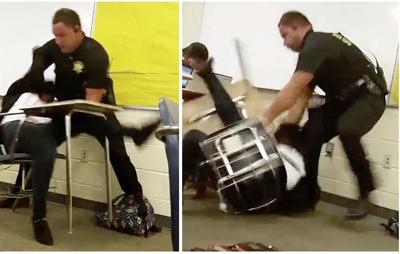Remember South Carolina’s old “disturbing schools” law? The one that made it a crime for students to “act in an obnoxious manner”? The one that prompted a sheriff’s deputy in Richland County to dump a high school student out of her desk and slide her across the floor when she refused to relinquish her cellphone? The one that same sheriff’s deputy used to charge a classmate for encouraging other students to video the incident — thus bringing the gut-wrenching scene to the public’s attention?
After that 2015 incident at Spring Valley High School went viral, we all got an education on how too many schools were relying on school resource officers to handle their routine discipline problems, which meant the sort of behaviors that ought to result in students being suspended or expelled were instead resulting in arrest, conviction and imprisonment.
The next year, the state Board of Education told schools to stop using police to help enforce school discipline, and nearly two years after that, the Legislature finally abolished the ridiculously broad law that made it a crime for a student to simply sass a teacher, let alone refuse to hand over a cellphone, yell or curse.
And we thought that was the end of it: We had solved this problem that was funneling too many disruptive students into a school-to-prison pipeline: giving them criminal records that would reduce their chances of succeeding in school, and increase their odds of committing what most of us think of as actual crimes.
It turns out we didn’t solve the problem. In an order last week, U.S. District Judge Margaret Seymour wrote that S.C. police have been using a similarly vague “disorderly conduct” law to arrest students for similarly disruptive behavior that shouldn’t be treated as a crime.
From 2015 through 2020, she noted, 5,210 young people were sent to the Department of Juvenile Justice for disorderly conduct — 73% of them for behavior that occurred in school; only 15% of the students arrested at school were charged with more serious crimes. The number of young people sent to DJJ for either disorderly conduct or disturbing schools dropped significantly after the disturbing schools law was changed, but there were still more than 1,000 children and teens sent to DJJ in the 2019-20 school year for disorderly conduct. And yes, there's a racial component of the problem — black kids are far more likely than white kids to get charged — but that's not the primary problem with the law. The primary problem is the law itself.
By its language, S.C. Code Section 16-17-530 seems to be aimed at drunks. But the language goes far beyond drunkenness, allowing police to charge not only those who are in a public place "in a grossly intoxicated condition" but also anyone who "otherwise conducts himself in a disorderly or boisterous manner.” Using "obscene or profane language" in public also constitutes disorderly conduct.
From a public policy perspective, that’s a problem; “disorderly and boisterous” sounds like a pretty good synonym for “adolescent.”
And although we wouldn’t encourage anyone to use profanity, there's simply no way to justify sending someone to jail — jail — simply for cursing. (The S.C. Court of Appeals has said profanity is illegal only when it’s accompanied by “fighting words” — words that, as the U.S. Supreme Court has said, “by their very utterance, inflict injury or tend to incite an immediate breach of the peace.” But the judge cited cases where students were charged with disorderly conduct for using profanity that didn’t cross that bar.)
Judge Seymour concluded that using South Carolina's disorderly conduct law for school discipline was a problem from a legal perspective as well, because the language is so all-inclusive that it’s impossible for people to guess when their behavior would cross the line from merely annoying to criminal conduct. Indeed, one police officer testified that another officer might arrest someone for behavior that didn’t faze him.
Because of that imprecision, Judge Seymour ordered the state to stop charging students with disorderly conduct while they’re in school. So, again: Problem solved. Right?
Again, not quite.
S.C. Attorney General Alan Wilson, who filed notice on Wednesday that he intends to appeal the ruling, raised a very practical objection in his defense of the current law: Police, he argued, need the law to handle “disruptive and fighting students who are yelling at staff and visitors, hitting other students, running away from staff, kicking over furniture, hitting doors, shoving staff and law enforcement.”
Judge Seymour observed that “the Constitution does not permit criminal laws broadly drafted to serve as all-purpose tools of law enforcement” and suggested that the state could “draft a law that addresses with specificity the concerns Defendant raises.” She’s certainly right about that second part.
Even if Mr. Wilson’s appeal succeeds and police are again allowed to use the “disorderly conduct” law in our schools, the Legislature should amend it to define what is and is not legal — both in school and out. Police have a lot discretion about when to arrest people and when not to, and appropriately so, but they shouldn’t have discretion about what is and isn’t a crime. And children and adolescents shouldn’t get sent to juvenile jail because they talk back to teachers, or even to police officers.













